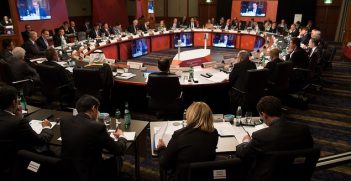Don’t Panic! The Constraints on Trump

There are three reasons not to panic come 20 January. As much as the talk suggests drastic changes are afoot with the arrival of President Trump, the domestic priorities of the new administration coupled with the constraining influence of the US military, will create an environment to mute and otherwise temper what will still be an uncertain few years.
Donald J. Trump will shortly be inaugurated as president of the United States. For many, Trump’s electoral success defied all expectations and for most his inauguration casts doubts on many long-held assumptions about how the US will interact with other states around the planet. Indeed, this topic has been a recurring point of discussion on these pages with pieces by various contributors including John McCarthy and Sven Biscop; I’m going to pile on, albeit with a slightly different focus.
In Going To War? a book co-edited by me with Stéfanie von Hlatky, we argue that military intervention is becoming more unlikely because of financial constraints, lack of public support and an absence of existential threats. Indeed, the contemporary operating environment is one of persistent, nuisance threats that are best dealt with by unconventional means, such as special forces or air strikes—frequently in combination. In short we argue that large-scale deployments of conventional forces are unlikely in the foreseeable future.
The impending inauguration of Trump and the uncertainty that this brings along with it makes such intervention even less likely. Moreover, despite the inflammatory language and incoherent or clumsy policy pronouncements of the soon-to-be ‘tweeter-in-chief’, which threaten to undo decades of hard-fought international norms and obligations, any actions that are taken will be tempered and somewhat muted in the end.
The first reason relates to the appetite of Trump’s team to meaningfully engage with issues of foreign policy. Early indications are that this appetite is limited. Domestic politics—even in the United States—plays better with voters than thorny and complex foreign policy.
Take for example 9/11, where public demand for action gave the Bush administration the political capital to initiate no less than two wars in two years. That capital was quickly exhausted as calls for an end saw a wholesale change in government eight years later. In the end, domestic issues will—pardon the pun—trump foreign ones. A president such as Trump, unmoved by ideology and perhaps the ultimate pragmatist, will quickly see that the best policy is one of limited intervention overseas.
The second reason is Trump’s focus on the strength of the domestic economy. Trump made the greatest electoral gains in places where the current system failed to raise all boats. Places like West Virginia, where unemployment is at staggering levels, voted for Trump in droves and helped put him in office on the promise that he would bring mining and much needed jobs back to small communities. This story is repeated all over the United States as growing inequality continues to leave more Americans behind. This is what put Trump in office and this is where his focus will likely be in the coming years if he wants to remain there for a second term.
The final and perhaps most salient point is that, as Robert Jervis has consistently argued, institutions are likely to constrain the commander-in-chief. The one institution most deserving of mention in this case is the military. As David Rothkopf recently noted in his weekly Editor’s Roundtable, the United States military is one of a few institutions in the United States that still enjoys broad public trust. So much so that Rothkopf suggests that, as alarming as the recent appointment to senior posts of no less than four retired general officers is to the idea of democracy and more importantly the concept of civilian control of the military, it could be worse. The military, in line with Jervis’ argument that institutions constrain what a president can and can’t do once in office, will serve to reign in some of Trump’s more radical proposals.
So how can the military constrain an administration if it is supposed to do the bidding of its elected masters—especially in the United States where the president is also the commander-in-chief of the military, outranking all generals. Shouldn’t soldiers just do what they are told? History of course is replete with examples that show this logic does not hold. A soldier simply saying they were ‘just following orders’—the Nuremburg defence—is no longer a suitable justification for actions that break the law, are unethical or immoral.
Soldiers are expected to exercise judgement as well as follow orders. Moreover, a vast literature has emerged since the end of World War II that examines how militaries and their elected, civilian masters interact. From Huntington’s concept of objective civilian control through Feaver’s agent and principal model and on to Bruneau and Matei’s three-part framework of control, effectiveness and efficiency, we see much that suggests an institution like the US military will constrain otherwise questionable policy pronouncements.
Moreover, any president—and it would seem this one in particular—is the proverbial ‘ideas guy’ in that they tell their staff what they want, often with little detail or direction on how. Institutions, such as the military, will come back with different ways to best accomplish this or recommend modifications that will reflect the professional interests of the institution and national interest of the country.
At a more individual level, with recently retired General James Mattis, one of Trump’s supposed “four star friends” at the helm of the Department of Defense, the toll that war takes on people will be most acutely appreciated. As the old saying goes, no one knows better the costs of war than a soldier. Mattis, having served in both Iraq and Afghanistan, knows full well the cost of intervention. It will not be entered into lightly, despite some rather blunt pronouncements from his boss that may be to the contrary.
These three reasons, a lack of interest in foreign policy, a focus on domestic economic gain, and the institutional constrains facing any president, all point to a Trump administration that may be more bark than bite. In short, don’t panic.
Hans Christian Breede holds a PhD in war studies from the Royal Military College of Canada and is an assistant professor of political science at The Royal Military College of Canada and deputy director of the Centre for International and Defence Policy at Queen’s University, both of Kingston, Canada.
This article is published under a Creative Commons Licence and may be republished with attribution.





